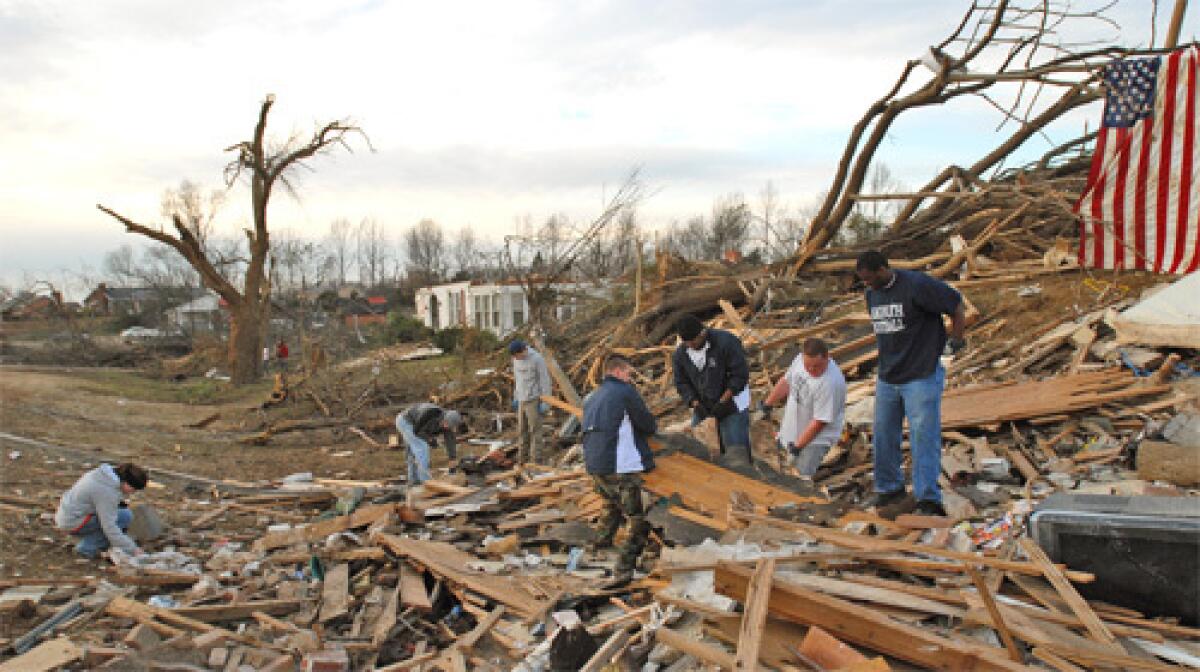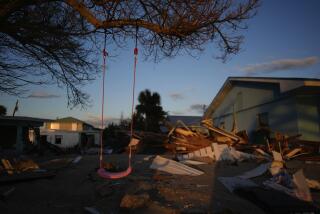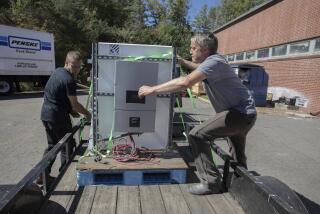In tornadoes’ path, focus turns to cleanup

HUNTERSVILLE, TENN. — They knew they couldn’t set this little country community right in a day -- the storms had been too brutal for that. But at least, they figured, they could clean it up.
All along the two-lane road through town, men in hunting jackets moved around quickly in heavy machinery, plowing and piling debris. Farmers in ball caps amputated horizontal cedars, poplars and pines with buzzing chain saws. Church ladies in fresh makeup and work gloves tidied the yards in front of roofless homes.
“I want to help if I can help,” said Betty Swims, 65, as she gathered fallen branches from the home of a local farmer. “It’s a great thing to do, I think. Every hand makes a difference.”
The scene played out in communities across the South on Thursday as residents and volunteers turned from locating the living and the dead to cleaning up and moving on.
Fifty-seven people were killed in Tuesday’s storms, the deadliest U.S. tornado disaster in nearly a quarter of a century. The death toll was 32 in Tennessee, 13 in Arkansas, seven in Kentucky and five in Alabama. More than 300 were injured, some in critical condition.
On Thursday morning, Homeland Security Secretary Michael Chertoff and Democratic Gov. Phil Bredesen of Tennessee boarded military helicopters to fly over a patchwork of neatly tended farm fields, small woods and signs of savage destruction. Trees meant to buffer fields from the wind lay like broken twigs along the road. Whole forests lay flattened as if felled by a giant weed-whacker.
The National Weather Service, which had teams conducting aerial scans to track the storm’s path and intensity, estimated that as many as 63 tornadoes -- some with winds as high as 160 mph -- had touched down across Tennessee, Arkansas and Alabama.
“It was truly a miracle that there were not lives lost,” Bredesen said after flying over Union University, a small college in Jackson, Tenn., that sustained major damage but no deaths.
Tornadoes eviscerated dorm rooms there, ripping the siding off buildings and leaving muddy pink insulation flapping in the wind.
“We can replace these buildings,” Chertoff told a crowd that included exhausted students clutching cans of Red Bull energy drink. “We cannot replace lost lives.”
Talk of miracles fanned through the northern Tennessee town of Castalian Springs, where an 11-month-old baby was found early Wednesday morning lying face down in a muddy pasture, 150 yards from where his home once stood.
“I thought it was a baby doll,” said David Harmon, 31, a firefighter who shone his flashlight on Kyson Stowell after searchers had already scoured the area. “Then it moved. I turned him over, and with a gasp of air, he started crying.”
The baby’s mother perished in the storm, but his grandparents took him home from the hospital with just a few grazes, Harmon said.
In neighboring Macon County, where 14 people died, rescue teams continued to search the countryside for trapped residents. On Wednesday night, searchers picking through the debris of a collapsed house rescued a family from the basement.
“It will take years to clean everything up,” said Shelvy Linville, mayor of Macon County, who lost one of his best friends, Jimmy Shaw. “We got so much rubble, could be we could find more bodies.”
In most of the region, the recovery was already in full swing. From Arkansas to Alabama, contractors loaded shredded trees onto flatbed trucks, utility workers restrung wires onto telephone poles, and residents picked through the rubble of their homes, hoping to retrieve mementos.
In Huntersville, an unincorporated Tennessee community about eight miles from Jackson, many homes were beyond repair. A few were little more than splintered wood and broken junk that the winds had fanned across green expanses of wheat fields.
Along state Highway 70, dozens of helpers tended to the property where three generations of the Verell family have grown corn and other crops on 2,500 acres. A 20-foot-high pile of debris had been set on fire behind their two ruined houses.
Michele Verell, 48, was on the second floor of a house with sloping floors and strange angles, cleaning out what was salvageable. A clutch of church friends had come, bringing food, comfort and assurances that they would build back bigger and better.
“This is their lives -- they’ve got to come back,” said Cathy Powell, 46, the wife of the preacher at North Jackson Church of Christ. “This is where their farms are.”
Verell’s husband built the house 24 years ago; they raised three children here. Its sturdy basement probably saved them Tuesday night. But at 2 p.m. Wednesday, an insurance adjuster said the house would have to be torn down. Since then, she said, she had been numbing herself with work.
“I haven’t tried to think about it,” she said. “You can’t think about it. You just do. It probably won’t sink in until they bulldoze it.”
Fausset reported from Huntersville and Jarvie from Atlanta. Times staff writer Nicole Gaouette in Jackson contributed to this report.
More to Read
Sign up for Essential California
The most important California stories and recommendations in your inbox every morning.
You may occasionally receive promotional content from the Los Angeles Times.











